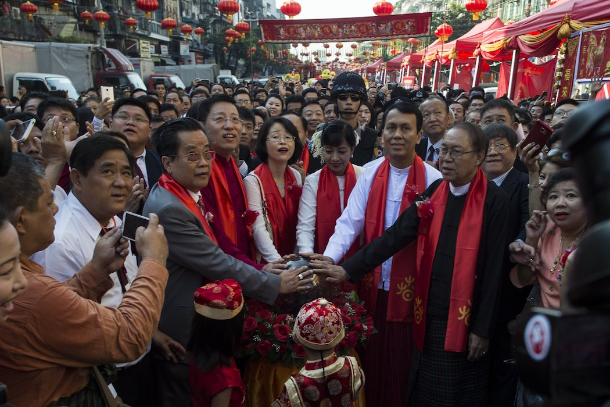
In this file
John Zaw, Mandalay
Myanmar
January 21, 2019
While Aung San Suu Kyi’s government has a strained relationship with the West over its handling of the Rohingya crisis, China has shielded Myanmar from international pressure and punitive action from the U.N. Security Council.
Beijing is now pressing Myanmar to revive the Myitsone Dam project, which has been suspended for seven years, in exchange for its diplomatic protection.
Work on the US$3.6 billion project in Kachin State started in 2008 but the military-backed government of then-president Thein Sein suspended its construction in September 2011 following protests and widespread environmental concerns. The issue became a major thorn in relations between the countries as China agitated for resuming work.
The hydroelectric dam would be the 15th largest in the world. The 6,000 megawatts of electricity it would produce is more than Myanmar’s entire power grid produces at present. However, the majority would be used by China despite Myanmar being chronically short of power.
Renewed Chinese pressure came when Chinese ambassador Hong Liang visited Kachin in December and met with political parties and social organizations.
Gumgrawng Awng Hkam, president of the Kachin Democratic Party, said Hong explained that more Chinese investments cannot be made due to the suspension of the dam project, which has affected the relationship between China and Myanmar.
Hong told the politicians that State Counselor Suu Kyi has changed her mind and wants to do development projects.
Awng Hkam said Hong asked them: “Can you write a letter to support the Myitsone Dam project and send it to the union government?”
“During the meeting, he talked as he wished and I felt his messages were like a threat or warning rather than discussion,” Awng Hkam told ucanews.com.
Myitsone Dam concerns entire population
Two weeks after the meeting, the Chinese embassy in Yangon released a statement saying that the local Kachin community were not against the project but some outside individuals and social organizations opposed it.
Three Kachin political parties quickly rebutted the Chinese claim.
“We didn’t say we support the Myitsone Dam. The Chinese embassy’s statement is misleading and has prompted concerns among local people,” said Awng Hkam, a former development worker. “We have totally opposed the dam project since the start and we don’t support restarting it.”
Steven Tsa Ji, general secretary of Kachin Development Networking Group, said Chinese officials have been courting people in Kachin every year but the recent meeting signaled more pressure.
He said China had used the tactic to gain support from local people, especially the Kachin community, while Suu Kyi’s government remains silent over the project.
“The government elected by the people needs to have courage and take a firm stand over the project. It is the right time to tell the public about the government’s decision,” Tsa Ji told ucanews.com.
“We will continue to fight development projects that harm the environment, are socially destructive and do not benefit the local community.”
Bertil Lintner, a Swedish observer of Myanmar affairs, said it would be “political suicide” for any person or party in Myanmar to give Myitsone Dam the green light. “No one in Myanmar wants it, and it’s not only a Kachin issue — it concerns the entire population of the country,” he told ucanews.com.
China wants to be main broker in Myanmar’s peace
Awng Hkam said the Chinese ambassador told them not to contact Western countries and gave a threat that “they would face difficult consequences.”
In 2016, Hong Liang urged his U.S. counterpart in Yangon not to travel to Kachin State or certain parts of Shan State because Washington should respect China’s interests, according to an Asia Times report on Jan. 16.
The U.S.-based Institute for Peace said in a report in September 2018 that “China believes it deserves to have predominant presence and influence in these areas, if not elsewhere in Myanmar, regardless of the wishes or interests of Myanmar, let alone the interests of other countries.”
China has managed to outmaneuver other foreign interlocutors and emerge as the main broker in Myanmar’s stuttering peace process, which is a major reason why Hong is opposed to Western diplomats visiting Myanmar’s war-torn northern border with China, Asia Times reported.
Hong also told Kachin politicians that China will help to end fighting in Myanmar’s north and facilitate the return of Kachin internally displaced persons.
Awng Hkam said: “We want the United Nations and the international community including the U.S. and European Union to become involved in Myanmar’s peace process as we doubt China’s dream of peace.”
China wants stability along its border
Myanmar’s military announced a partial ceasefire in northern areas from Dec. 21 to April 30 in a move that observers see as the result of Chinese pressure.
“But China is not interested in peace the way people in Myanmar see it — that is, a political solution to decades of ethnic wars. China doesn’t want war either; it wants stability, which for the time being means a status quo it can use to achieve its geostrategic goals,” Lintner said.
He said that being the main mediator in talks between the government, military and armed ethnic groups serves this purpose and so does providing the United Wa State Army with modern, sophisticated weaponry.
The Chinese government is pushing Myanmar’s government, military and armed groups along its border to end fighting as stability allows for its investments to proceed, including strategic infrastructure projects under its Belt and Road initiative and the China-Myanmar Economic Corridor.
Lintner said Myanmar opened up to the West in 2011 mainly because of the ruling military’s desire to lessen dependence on China, but the Rohingya crisis has led to the West distancing itself from Myanmar and China re-emerging as the country’s main ally.
The new shift could have unpredictable consequences for Myanmar’s political future, he said.
